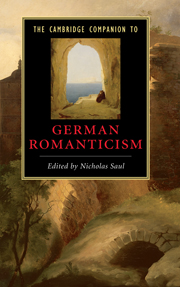Book contents
- Frontmatter
- 1 What is Romanticism, and where did it come from?
- 2 From early to late Romanticism
- 3 Prose fiction of the German Romantics
- 4 The Romantic lyric
- 5 The Romantic drama
- 6 Forms and objectives of Romantic criticism
- 7 Romanticism and Classicism
- 8 Women writers and Romanticism
- 9 The Romantics and other cultures
- 10 Love, death and Liebestod in German Romanticism
- 11 Romantic philosophy and religion
- 12 Romantic politics and society
- 13 Romantic science and psychology
- 14 German Romantic painters
- 15 Romanticism and music
- 16 Transformations of German Romanticism 1830-2000
- Key authors and their works
- Further reading
- Index
16 - Transformations of German Romanticism 1830-2000
Published online by Cambridge University Press: 28 September 2010
- Frontmatter
- 1 What is Romanticism, and where did it come from?
- 2 From early to late Romanticism
- 3 Prose fiction of the German Romantics
- 4 The Romantic lyric
- 5 The Romantic drama
- 6 Forms and objectives of Romantic criticism
- 7 Romanticism and Classicism
- 8 Women writers and Romanticism
- 9 The Romantics and other cultures
- 10 Love, death and Liebestod in German Romanticism
- 11 Romantic philosophy and religion
- 12 Romantic politics and society
- 13 Romantic science and psychology
- 14 German Romantic painters
- 15 Romanticism and music
- 16 Transformations of German Romanticism 1830-2000
- Key authors and their works
- Further reading
- Index
Summary
German Romanticism emerged before the great ideologies and social movements that would shape German and European life in much of the nineteenth and twentieth centuries. In the Germany of 1800, nationalist conservatism, democratic liberalism and internationalist socialism, or a political dichotomy between right and left, did not exist. Accordingly, the intrinsic concerns of early Romanticism are at odds with many of the issues that dominate subsequent political and cultural controversies. Friedrich von Hardenberg (Novalis) uses words like 'monarchy' and 'republic' not to denote particular forms of state constitution but as metaphors that evoke the creation of a common, spiritually full life. His vision is informed by the oppositions between poetic and prosaic forms of existence, and between transcendental, spiritual insight and instrumental, worldly prudence. The French Revolution, the Ancien Régime and the realities of Prussian Absolutism all come down on the latter side. And in its reliance on philosophical reflection, the cultural revival Hardenberg envisages differs from traditionalist conceptions of natural growth. These philosophical, spiritual and apolitical features of early Romanticism provide an alternative frame of reference that allows us to question, qualify or reject the methods and goals of modern politics. In the politicised contexts of modern societies, however, these features can in effect support, or be appropriated for, political ends that are alien to early Romanticism.
- Type
- Chapter
- Information
- The Cambridge Companion to German Romanticism , pp. 257 - 280Publisher: Cambridge University PressPrint publication year: 2009
- 1
- Cited by

